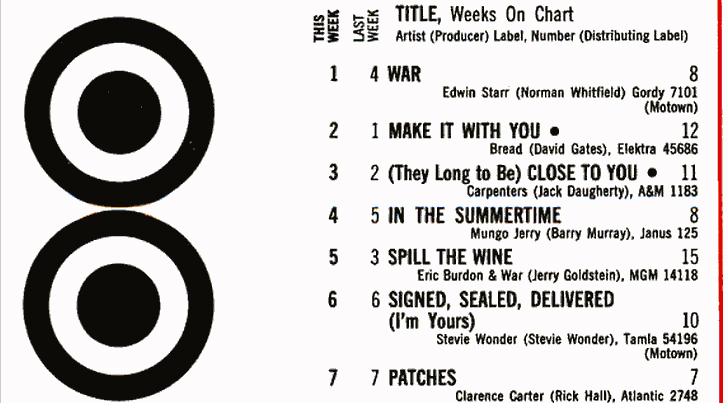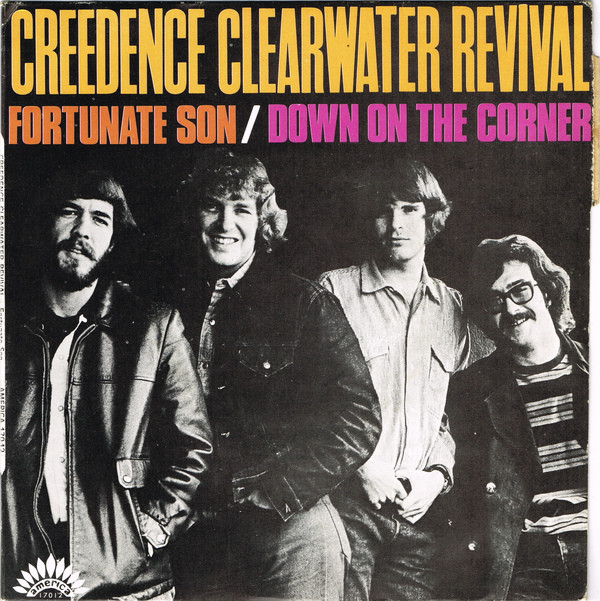Charting the Music of the War

A 2018 headline from satirical music news website TheHardTimes.net reads: "Documentary About 'Fortunate Son' to Feature Vietnam War." The linkage between a core canon of anti-war anthems and the war itself has been cemented in popular depictions of the conflict after its closing such as Platoon or Forest Gump. Regardless, the typical sound and image tropes abound from "For What Its Worth" playing under a long shot of protesters marching to a wide aerial pan of helicopters flying over wetlands scored by "Fortunate Son." When considering the actual commercial reception of these songs a much more nuanced and complicated picture of popular music's role in the war comes to the surface. To be sure, "For What Its Worth" made its impact as did Creedence Clearwater Revival, but so too did SSgt. Barry Sadler, Victor Lundberg, and Everett Dirksen.

The interactive graphic below shows the chart performance of singles that make reference to the war over the course of the war (1955-1975). Hover over a bubble on the graph below to learn more. Songs for this page are sourced from the Vietnam War Songs discography
Singles of the Vietnam War on the Billboard Hot 100
The contours of the above singles tell a story of the war. Looking purely at quantity, the number of charting singles that refer to Vietnam follow the arc of American involvement in the conflict. 1955 marks the beginning of official U.S. engagement with the creation Military Assistance Advisory Group (MAAG) for South Vietnam providing aid to South Vietnam in the aftermath of the First Indochina War. However, it is not until the deaths of MAAG Vietnam forces in 1959 that the American presence in Southeast Asia registers at home. Following the Kennedy Assassination and the Gulf of Tonkin incident in 1963 and 1964, respectively, there was a dramatic escalation in the war and total number of combatants. Correspondingly, the conflict was not visible on the charts until 1959 and then was present only sparsely until a dramatic surge beginning in 1965 and culminating in 1970. This swell correlates to the Americanization policies of Johnson who pushed for greater presence of American forces even as the war became increasingly unpopular in the U.S. Nixon's converse policy of Vietnamization saw a progressive withdrawal of troops marked by the end of direct military support in 1973 and the evacuation of remaining American personnel before the war's end in 1975.
Total Vietnam War Related Singles in Hot 100 by Year
Support and Revival
In the early years of the war, the charts show songs that stuck to established tropes from the early wars of the century: duty, pride, and separation with the hope of return. In a few notable cases artists went beyond merely echoing sentiments of wars past to re-record iconic war songs or even release a sequel. "God Bless America," written during World War I and revised and released just before World War II, makes an appearance on the charts in 1960, but remained a potent connection to wars past throughout the coming decade as it became a counter-protest anthem in support of the war. In some cases, Cold War patriotism and anxieties intermingled with a growing awareness of the war in Vietnam as in the lengthily-titled "There's a Star Spangled Banner Waving Somewhere #2 (The Ballad of Francis Powers) a sequel to the WWII hit, adapted to center on the 1960 U-2 incident. Also still popular from earlier wars were military slice-of-life novelty songs such as the revived "Deck of Cards" in which a soldier reprimanded for playing poker in church explains each card as a biblical symbol or the newly composed "Soldier's Joy" which imagines Washington and John Paul Jones celebrating their Revolutionary War victories with a hoedown.
Voices of Protest
In popular culture, Vietnam is inseparable from the music which responded to and critiqued the conflict. Even from the early years of the conflict songs echoing an exhaustion with war resonated widely. Following the revival of lyrical tropes from prior wars, songwriters began by lamenting the losses of any war. This early dissatisfaction with the war is evidenced in The Kingston Trio's recording of Pete Seeger's "Where Have All the Flowers Gone?" peaking at twenty-one in 1962 with the three singing, "where have all the young men gone? Gone for soldiers every one, when will they ever learn?" Over the next three years, Vietnam and the growing human costs of the conflict were addressed from the top of the charts in Barry McGuire's "Eve of Destruction" and Bob Dylan's "Blowin' In the Wind." In 1966, the Hot 100 was dominated by the pro-war "Ballad of the Green Berets" and the next year, songs that dealt with Vietnam in the charts generally addressed it in a more oblique manner. The period of 1968-1971 however is marked by iconic anti-war songs at their most popular including "All Along the Watchtower" and "Revolution" in 1968, "Fortunate Son" in 1969, "War" and "Ball of Confusion" in 1970, and "What's Going On," "Bring the Boys Home" and "Imagine" in 1971.
Persistent Lack of Silence
In November 1969, President Nixon famously called for unified support ahead of negotiations in Paris appealing to what he deemed the "silent majority" of Americans who were not opposed to the war in Vietnam. As evidenced in the above protest songs support for the war in popular music dropped dramatically over the course of the war. Still, defenders of the conflict were never totally silent, or in turn, absent from the Hot 100. In 1966, as the Animals' "We've Gotta Get Out of This Place" was being requested by in-country DJs, Staff Sergeant Barry Sadler's "The Ballad of the Green Berets" hit number-one. That same year Senate Minority Leader Everett Dirksen became an unlikely hitmaker with his halted spoken-word-with-orchestra piece, "Gallant Men." In the song, Dirksen commends the sacrifices of the Armed Forces while calling more to arms saying, "tyrants must know, now as was then, they cannot stand, not as long as there are gallant men." Spoken word with orchestra became a popular texture for songs supporting the conflict as in Victor Lundberg's 1968 single against draft-dodging, "Open Letter to My Teenage Son" or in the three charting recordings of Canadian radio personality Gordon Sinclair's call for global support of the U.S., "The Americans."
While songs supporting the conflict in Vietnam made it to the pop charts relatively rarely, they were at home on Billboard's Hot Country Songs. Merle Haggard's "Okie From Muskogee" and "Fightin' Side of Me" crossed over to the pop charts but did relatively poorly compared with the number-one spots they secured on the country charts.
Final Decline
While 1968 was the peak for American troop totals deployed as part of the conflict, 1970 was the high-water mark for the war's presence on the pop charts. Following Nixon's policy of Vietnamization, American servicemember totals in Vietnam dropped sharply from 1971-1973 which is mirrored in the number of charting singles referencing the war over that period. By 1974, American combat troops had officially withdrawn and those that remained were in an advisory position The small spike in songs on the charts referencing the war is characterized by anger at Nixon as he left office ("You Haven't Done Nothin"), exhaustion as the conflict continued ("There Will Never Be Any Peace") and calls for the global community to support the U.S. ("The Americans").
Vietnam was unprecedentedly divisive and the charts show how the conflict shaped popular culture from its epicenter. While it is clear that the soundtrack of the Vietnam put forth by Zemeckis, Stone, Kubrick, and others after the war's end has its basis in the sonic landscape of the time, considering actual sales numbers and airplay gives us a much richer, more complex score complicating the sometimes one-dimensional portrayals of the war.
